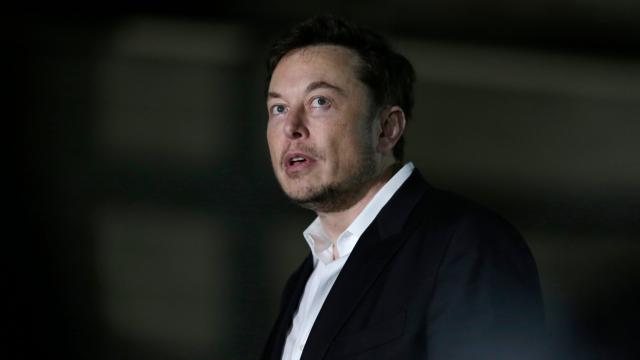Earlier this month, Tesla and SpaceX CEO Elon Musk added to his seemingly never-ending drama by announcing via Twitter that he had “funding secured” to take Tesla private at $US420 ($573) a share. The tweet quickly blew up in his face, drawing Securities and Exchange Commission attention and generating chaos for the company. When Musk finally announced he was backing off the plan late Friday evening, it was less a surprise than another affirmation of his declining credibility.
Now, per a report this weekend in the New York Times, more details about what exactly was going on in Musk’s head when he hit that tweet button have emerged. It’s long been clear that Musk viewed taking the company private as a way to quiet down its constant market volatility and focus on production, but it doesn’t really look like he contemplated all the possible consequences of that course of action. Sources familiar with the situation told the paper the CEO eventually conceded his initial assessment of the idea was, in the Times’ phrasing, “overly simplistic” and not at all the magic bullet he had believed:
In that time, according to five people close to the events, Mr Musk came to realise that his thinking had been overly simplistic. While going private might have removed some problems, it would have introduced new ones.
Among his concerns were ceding too much control to private investors — including conventional car companies and Saudi Arabia, a symbol of big oil — and shutting out smaller investors who might be unable to retain a stake.
Specifically, one of the primary investors that Musk believed he had “secured” was Saudi Arabia’s sovereign wealth fund, which the nation is using to diversify its economy in anticipation of a less oil-dependent future. But according to the Times, others had to explain to Musk that any investment would have strings attached:
By the account of people familiar with Mr Musk’s thinking, deepening ties with new private investors presented its own challenges. By taking money from Saudi Arabia’s sovereign wealth fund—something Mr Musk said he believed was a sure thing—Tesla would have been teaming up with a country whose very foundation is fossil fuels, and one often criticised on human-rights grounds.
That cognitive dissonance—an electric-car company backed by big oil—was pointed out to Mr Musk several times, these people said.
The Times added that discussions with the Saudi investment fund managers and others from different countries made it obvious that some wanted more out of a deal than just a cut of the company’s stock. Specifically, some of the sovereign funds wanted Tesla to open production facilities in their home countries—something that would tie the company’s image more directly to the new stockholders and risk a rerun of its production nightmares.
It doesn’t sound from the report like these issues were hammered out before Musk sent the tweet. The paper also wrote that discussions had proceeded with “several big carmakers” about financing, though some of them had “reputational baggage.” Just like with the sovereign funds, Musk also did not want to give up his control over the Tesla manufacturing process or shift production away from his U.S. facility in California, the Times wrote.
Other issues that became clear were that it would be nearly impossible to engineer a plan in which all current Tesla investors could have taken part in a buyout, the Times noted. Per the Associated Press, Musk’s “funding secured” tweet also did not contain some relevant information, such as that the Saudi fund was still doing due diligence on the possible deal. This would all seem to confirm that Musk’s initial tweet was at the very least hasty and misleading, which is the basis of the SEC inquiry. It will probably also not quiet speculation that he might have been bluffing.
Tesla shares never came near the theoretical $US420 ($573) buyout price, meaning that traders had already sensed something was off and did not expect the company to complete the deal.
“The fact that he’s now backing off so quickly, within a matter of weeks, indicates the insincerity in which the first statement was made,” Duke University corporate governance and securities law expert James Cox told the AP.
“Tesla investors must realise that they have a panicky, erratic, possibly self-destructive CEO at the helm,” Yale School of Management professor Jeffrey Sonnenfeld told the Times. “No CEO. is ever this confused and confusing… major enterprise should not navigate its ownership path and market valuation through the frantic, public, volatile impulses of the CEO.”
This is just the latest in a long string of bizarre incidents instigated in part or whole by Musk, including picking fights with journalists, baselessly smearing one of the men involved in a Thai cave rescue as a pedophile, weird interviews, and a sprawling beef involving rapper Azealia Banks and musician Grimes. While he has by all accounts been working to the point of exhaustion at Tesla, his frame of mind at the moment he sent the tweet is unlikely to dissuade the SEC, which the Times recently reported has several potential avenues to charge Musk and crew with violations of antifraud laws. If it does, the result could be fines or worse.
